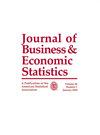估计边际与联合的密度比:在因果推理中的应用
IF 2.5
2区 数学
Q1 ECONOMICS
引用次数: 0
摘要
摘要在数据科学的各个领域,研究人员经常面临估计两个概率密度之比的问题。特别是在因果推断的背景下,处理变量和协变量的边际值与其联合密度比的乘积通常出现在构建因果效应估计量的过程中。本文将Kanamori、Hido和Sugiyama的一般最小二乘密度比估计方法应用于边缘与关节密度比的乘积,并证明了其特别适用于连续治疗效果和剂量反应曲线的因果推断。通过一个模拟研究和一个实证例子来说明所提出的方法,以调查美国总统竞选数据中政治广告的处理效果。本文章由计算机程序翻译,如有差异,请以英文原文为准。
Estimating Density Ratio of Marginals to Joint: Applications to Causal Inference
Abstract In various fields of data science, researchers often face problems of estimating the ratios of two probability densities. Particularly in the context of causal inference, the product of marginals for a treatment variable and covariates to their joint density ratio typically emerges in the process of constructing causal effect estimators. This article applies the general least square density ratio estimation methodology by Kanamori, Hido and Sugiyama to the product of marginals to joint density ratio, and demonstrates its usefulness particularly for causal inference on continuous treatment effects and dose-response curves. The proposed method is illustrated by a simulation study and an empirical example to investigate the treatment effect of political advertisements in the U.S. presidential campaign data.
求助全文
通过发布文献求助,成功后即可免费获取论文全文。
去求助
来源期刊

Journal of Business & Economic Statistics
数学-统计学与概率论
CiteScore
5.00
自引率
6.70%
发文量
98
审稿时长
>12 weeks
期刊介绍:
The Journal of Business and Economic Statistics (JBES) publishes a range of articles, primarily applied statistical analyses of microeconomic, macroeconomic, forecasting, business, and finance related topics. More general papers in statistics, econometrics, computation, simulation, or graphics are also appropriate if they are immediately applicable to the journal''s general topics of interest. Articles published in JBES contain significant results, high-quality methodological content, excellent exposition, and usually include a substantive empirical application.
 求助内容:
求助内容: 应助结果提醒方式:
应助结果提醒方式:


